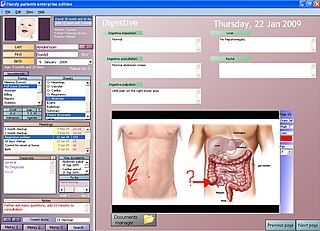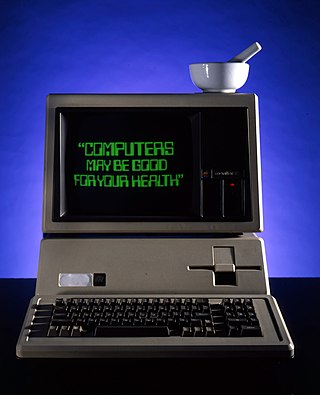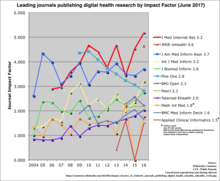
Health informatics is the field of science and engineering that aims at developing methods and technologies for the acquisition, processing, and study of patient data, which can come from different sources and modalities, such as electronic health records, diagnostic test results, medical scans. The health domain provides an extremely wide variety of problems that can be tackled using computational techniques.
The Sociedade Brasileira de Informática em Saúde, abbreviated as SBIS, is a professional society created in November 1986 in Campinas, during the First Brazilian Congress on Health Informatics. It has the mission of promoting the development and the interchange of ideas and results in the fields devoted to the information technologies applied to the health sciences.
The International Medical Informatics Association (IMIA) is an independent organization that plays a role in promoting and furthering the application of information science in modern society, particularly in the fields of healthcare, bioscience and medicine. It was established in 1967 as a technical committee of the International Federation for Information Processing (IFIP). It became an independent organization in 1987 and was established under Swiss law in 1989.

An electronic health record (EHR) is the systematized collection of patient and population electronically stored health information in a digital format. These records can be shared across different health care settings. Records are shared through network-connected, enterprise-wide information systems or other information networks and exchanges. EHRs may include a range of data, including demographics, medical history, medication and allergies, immunization status, laboratory test results, radiology images, vital signs, personal statistics like age and weight, and billing information.
Revista Cubana de Información en Ciencias de la Salud is a Spanish language journal of medical informatics published by the National Center of Information on Medical Sciences in Cuba. It was first published in 1993 and is the first Spanish-language journal to be published on the subject of medical informatics.

The Indian Association for Medical Informatics (IAMI) is a professional society that plays a role in promoting and furthering the application of informatics in the fields of healthcare, bioscience and medicine in India. It was established in Feb 1993 by Prof. Dr. Nanduri Gajanana Rao BSc, MBBS, MNAMS, PhD at Nizam's Institute of Medical Sciences, Hyderabad. Registered at District Registrar of Societies on 18 Sep 1993 - Regn No. 3774/93

Gunther Eysenbach is a German-Canadian researcher on healthcare, especially health policy, eHealth, and consumer health informatics.
The European Federation for Medical Informatics (EFMI) is a non-profit organization, which was conceived at a meeting, assisted by the Regional Office for Europe of the World Health Organization (WHO), in Copenhagen,, in September 1976.
The ISO/TC 215 is the International Organization for Standardization's (ISO) Technical Committee (TC) on health informatics. TC 215 works on the standardization of Health Information and Communications Technology (ICT), to allow for compatibility and interoperability between independent systems.
Edward ("Ted") Hance Shortliffe is a Canadian-born American biomedical informatician, physician, and computer scientist. Shortliffe is a pioneer in the use of artificial intelligence in medicine. He was the principal developer of the clinical expert system MYCIN, one of the first rule-based artificial intelligence expert systems, which obtained clinical data interactively from a physician user and was used to diagnose and recommend treatment for severe infections. While never used in practice, its performance was shown to be comparable to and sometimes more accurate than that of Stanford infectious disease faculty. This spurred the development of a wide range of activity in the development of rule-based expert systems, knowledge representation, belief nets and other areas, and its design greatly influenced the subsequent development of computing in medicine.

Homer Richards Warner was an American cardiologist who was an early proponent of medical informatics who pioneered many aspects of computer applications to medicine. Author of the book, Computer-Assisted Medical Decision-Making, published in 1979, he served as CIO for the University of Utah Health Sciences Center, as president of the American College of Medical Informatics, and was actively involved with the National Institutes of Health. He was first chair of the Department of Medical Informatics at the University of Utah School of Medicine, the first American medical program to formally offer a degree in medical informatics.
Health information technology (HIT) is health technology, particularly information technology, applied to health and health care. It supports health information management across computerized systems and the secure exchange of health information between consumers, providers, payers, and quality monitors. Based on a 2008 report on a small series of studies conducted at four sites that provide ambulatory care – three U.S. medical centers and one in the Netherlands, the use of electronic health records (EHRs) was viewed as the most promising tool for improving the overall quality, safety and efficiency of the health delivery system.
Health informatics in China is about the Health informatics or Medical informatics or Healthcare information system/technology in China.
Informatics is the study of computational systems. According to the ACM Europe Council and Informatics Europe, informatics is synonymous with computer science and computing as a profession, in which the central notion is transformation of information. In other countries, the term "informatics" is used with a different meaning in the context of library science, in which case it is synonymous with data storage and retrieval.
Methods of Information in Medicine is a peer-reviewed scientific journal covering research in medical informatics. It is an official journal of the International Medical Informatics Association, the European Federation for Medical Informatics, and the German Association for Medical Informatics, Biometry and Epidemiology. It is the oldest and longest running journal in its field.
Translational bioinformatics (TBI) is a field that emerged in the 2010s to study health informatics, focused on the convergence of molecular bioinformatics, biostatistics, statistical genetics and clinical informatics. Its focus is on applying informatics methodology to the increasing amount of biomedical and genomic data to formulate knowledge and medical tools, which can be utilized by scientists, clinicians, and patients. Furthermore, it involves applying biomedical research to improve human health through the use of computer-based information system. TBI employs data mining and analyzing biomedical informatics in order to generate clinical knowledge for application. Clinical knowledge includes finding similarities in patient populations, interpreting biological information to suggest therapy treatments and predict health outcomes.

Christopher G. Chute is a Bloomberg Distinguished Professor at Johns Hopkins University, physician-scientist and biomedical informatician known for biomedical terminologies and health information technology (IT) standards. He chairs the World Health Organization Revision Steering Group for the revision of the International Classification of Diseases (ICD-11).

Health information on the Internet refers to all health-related information communicated through or available on the Internet.
Lawrence Leonard Weed was an American physician, researcher, educator, entrepreneur and author, who is best known for creating the problem-oriented medical record as well as one of the first electronic health records.

Dean Forrest Sittig is an American biomedical informatician specializing in clinical informatics. He is a professor in Biomedical Informatics at the University of Texas Health Science Center at Houston and Executive Director of the Clinical Informatics Research Collaborative (CIRCLE). Sittig was elected as a fellow of the American College of Medical Informatics in 1992, the Healthcare Information and Management Systems Society in 2011, and was a founding member of the International Academy of Health Sciences Informatics in 2017. Since 2004, he has worked with Joan S. Ash, a professor at Oregon Health & Science University to interview several Pioneers in Medical Informatics, including G. Octo Barnett, MD, Morris F. Collen, MD, Donald E. Detmer, MD, Donald A. B. Lindberg, MD, Nina W. Matheson, ML, DSc, Clement J. McDonald, MD, and Homer R. Warner, MD, PhD.














